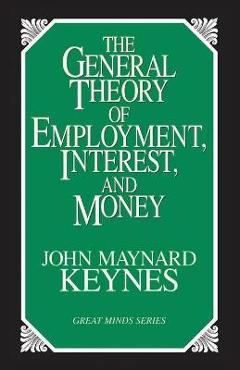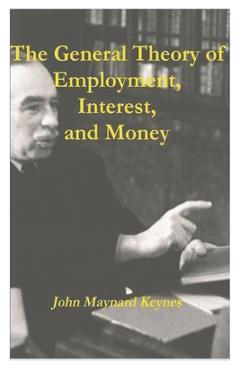The General Theory of Employment, Interest, and Money - John Maynard Keynes

Detalii The General Theory of Employment,
libris.ro
150.11 Lei
166.79 Lei
Business & Economics
John Maynard Keynes
The General Theory of Employment, - Disponibil la libris.ro
Pe YEO găsești The General Theory of Employment, de la John Maynard Keynes, în categoria Business & Economics.
Indiferent de nevoile tale, The General Theory of Employment, Interest, and Money - John Maynard Keynes din categoria Business & Economics îți poate aduce un echilibru perfect între calitate și preț, cu avantaje practice și moderne.
Preț: 150.11 Lei
Caracteristicile produsului The General Theory of Employment,
- Brand: John Maynard Keynes
- Categoria: Business & Economics
- Magazin: libris.ro
- Ultima actualizare: 28-10-2025 01:22:05
Comandă The General Theory of Employment, Online, Simplu și Rapid
Prin intermediul platformei YEO, poți comanda The General Theory of Employment, de la libris.ro rapid și în siguranță. Bucură-te de o experiență de cumpărături online optimizată și descoperă cele mai bune oferte actualizate constant.
Descriere magazin:
John Maynard Keynes was born in Cambridge, England, on July 5, 1883. His father, John Neville Keynes, was a professor and administrator at Cambridge University and himself the author of The Scope and Methods of Political Economy. After attending Eton (1897-1902), Keynes entered King\'s College, where he studied economics. Following graduation, he worked in the India Office (1906-1908); lectured on economics at Cambridge (1908); was made a fellow of King\'s College (1909), editor of the Economic Journal, and secretary of the Royal Economic Society (1911); and accepted a position in the British treasury. In 1919 Keynes was principal representative of the treasury at the Paris Peace Conference. Disturbed by developments at the conference, however, he soon resigned. His Economic Consequences of the Peace (1919) gave voice to his strong objection to the punitive measures being enacted against Germany. In this eloquently argued and strangely prescient work, Keynes detailed the problems that would result from the war reparations to be made by conquered Germany beyond her ability to pay, as well as the devastating economic, social, and political consequences of continuing European ultranationalism. Keynes returned to England to resume teaching at Cambridge (1920-37), during which time he gave the Sidney Ball Lecture that was published as the pamphlet The End of Laissez-Faire (1926) and wrote his main work, The General Theory of Employment, Interest, and Money (1935-36). Critiquing the neoclassical theory of Alfred Marshall, namely, that a normally functioning market economy leads to full employment, Keynes showed that a market economy can operate at less than full employment and that it may even work against reducing unemployment. Keynes advocated enlightened governmental intervention over unregulated laissez-faire policies. The Keynesian analysis of how monetary and financial arrangements affect the economy has formed the basis of subsequent activist governmental fiscal and monetary policy. Heart trouble ended Keynes\'s academic career in 1937. However, he remained active as an adviser to the chancellor of the exchequer (1940) and as principal British delegate and negotiator at the Bretton Woods Conference (1944), Stage II of Lend Lease (1944), arrangements for a United States loan to Britain (1945), and the inauguration of the International Monetary Fund and the International Bank (1946). In 1942, he was raised to the peerage, being named 1st Baron Keynes of Ti

Produse asemănătoare
Produse marca John Maynard Keynes

The Economic Consequences of the Peace - John Maynard Keynes
![]() libris.ro
libris.ro
Actualizat in 28/10/2025
48.69 Lei

The General Theory Of Employment, Interest And Money - John Maynard Keynes
![]() libris.ro
libris.ro
Actualizat in 28/10/2025
238 Lei

The General Theory of Employment, Interest, and Money - John Maynard Keynes
![]() libris.ro
libris.ro
Actualizat in 28/10/2025
59.15 Lei

The General Theory of Employment, Interest and Money - John Maynard Keynes
![]() libris.ro
libris.ro
Actualizat in 28/10/2025
167.35 Lei

The General Theory of Employment, Interest, and Money - John Maynard Keynes
![]() libris.ro
libris.ro
Actualizat in 28/10/2025
150.11 Lei
